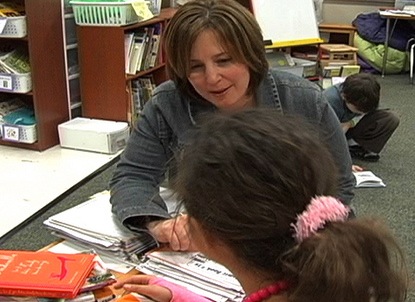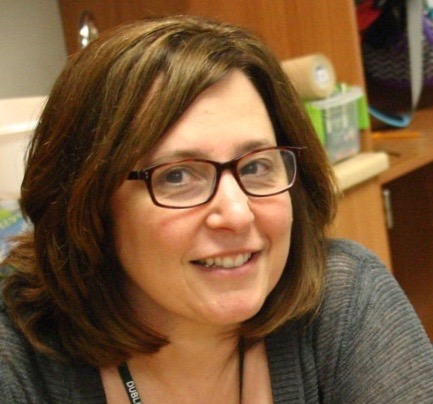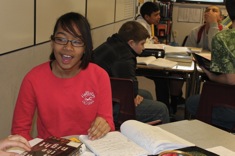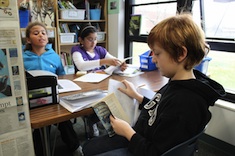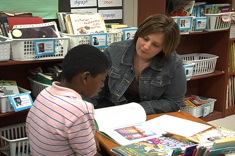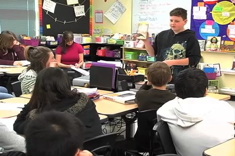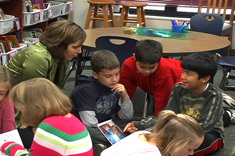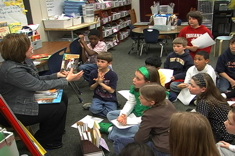One thing I miss about landline phones is the conversations I used to have with my friends’ children. I came to know lots of my friends’ children from quick conversations on the telephone. When I called to chat with a friend, usually one of the children in the house answered. I called some friends several times a week, meaning these short conversations with their children really added up over the years. Even though the conversations with them were very short, I had so many of them that I came to know them well.
Literary chitchat can be like that too—lots of small conversations that really add up. I used to think only the work I did in reading workshop “counted” as teaching. I now realize that the chitchat that happens throughout the day, those small conversations that add up over time, are also key to supporting students’ book choosing. I initiate these conversations in many ways, both formal and informal, and it all counts in developing a relationship around books.
I am committed to student choice in book selection. I know that the more students read, the better readers they become. But I also know that I want them to be readers after they leave my classroom. I want them to begin to know themselves as readers, and I want them to have the skills and strategies they need to choose books they will fall in love with.
Instead of choosing books by level, I want students to choose books in the same way that I do—based on their interests, their tastes, their moods, and the time they have available to read. Over the last several years, I have thought long and hard about what this means for how I converse with children.
When I talk with students about book choice, I have to make sure that I stay true to these big goals. For those students who have difficulty choosing books, it is often tempting to just put a book in their hands without talking to them about why they might read that particular book. But I know that choosing the right book is just as important as learning to choose books. I have to remember that my goal in book choice is twofold. I want students to choose a book that will keep them engaged. But I also want them to learn good book-choice skills that will help them pick good books long after they leave the classroom. I want to have conversations about books in both formal and informal ways:
I try to take advantage of transitions in the classroom. Rather than worrying that these are quiet times, I use transitions to fit in some of this literary chitchat. I use the time when students arrive in the morning, when they are getting their things ready to go home, and the shuffling between activities to touch base with students about their reading. I often make it a point to walk next to a different child when we are on our way to lunch or recess. This gives me a chance for informal conversation, and I often check in about a book they are reading—one they have just about finished, or one I think they might enjoy.
Throughout the year, minilessons serve to help students choose good books. Sometimes I may share a stack of books, and other times we will talk about strategies that are working for us when choosing books. Often these lessons take the entire minilesson spot for the day. On other days, it is just a minute or two of chat before or after the actual minilesson.
Talking about our reading before and after major vacations helps students think about their reading in new ways. When a long weekend or a school vacation is approaching, we often spend time talking about whether our plans allow for reading a longer book. For example, will we have lots of time in a plane or car? Will we have extra downtime, or will we be extra busy? Is this a good time to start a longer book because we will have longer periods of time to get started? We also spend time sharing our reading when we get back. Students come to know that our first conversations after time off will most likely include some talk about the things we read while we were away.
Reading conferences often focus on book choice. Once students realize that I read a great deal, they often ask my opinion about what to read next. I have to make sure to allow time for these types of conferences if I want students to become skilled in choosing good books.
After a few months of school, this literary chitchat around books doesn’t really need to be planned. It just becomes the talk of the classroom community. Children initiate conversations about the books they are reading and expect that I will be interested. They share their reading with each other in line and during transitions.
To put the scaffolds in place for good book choice, I make sure to focus on helping kids understand why readers choose a book at a certain time. Below is a list of questions that I often pull from in both formal and informal conversations with my students:
Thinking Ahead in Your Reading
- Are there any series, authors, or genres that you’ve read that you would like to read more of?
- Is there an author, series, or genre that you haven’t read yet but would like to try?
- Is there a book that you quit earlier this year that you might want to go back to and try again?
- Is there something that you want to try that you weren’t ready or in the mood for earlier in your reading life?
- Is there a book that has caught your eye?
- Is there a book that you might want to read because you read or heard about it in a review?
- Is there a book that a friend has recommended that sounds like a good fit?
- Is there a nonfiction topic that you’d like to read about?
- Is there a poetry book that you’d like to read more of?
- Are there any books that you’ve read that you’d like to reread?
- Is there an author, genre, or series that we’ve read in read-aloud that you’d like to try on your own?
- Are there any books in your box that you have changed your mind about—books that you want to put away?
- What types of books are you in the mood for?
- Are you in the mood for long or short books?
- What kind of time will you have this spring? Is it a busy time? Will you be sitting at a brother or sister’s sports practices?
- Are there books that would be better for you to save for summer?

